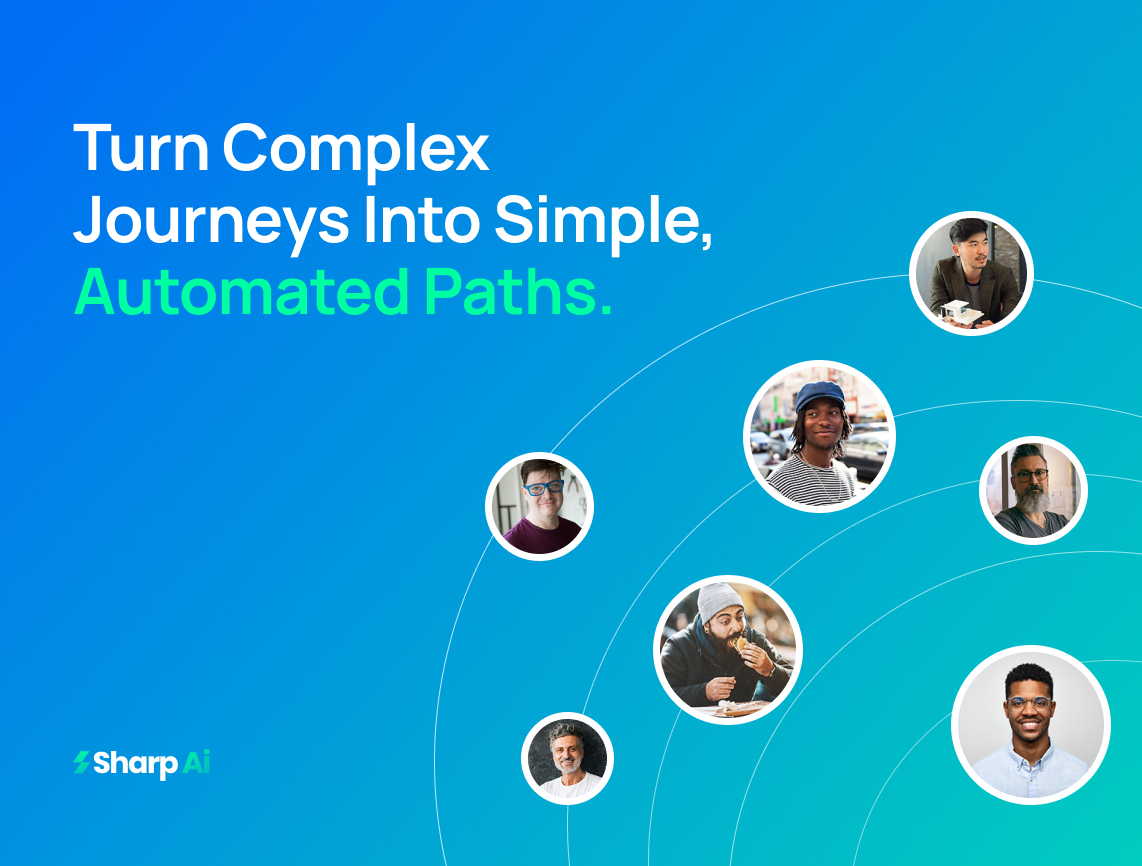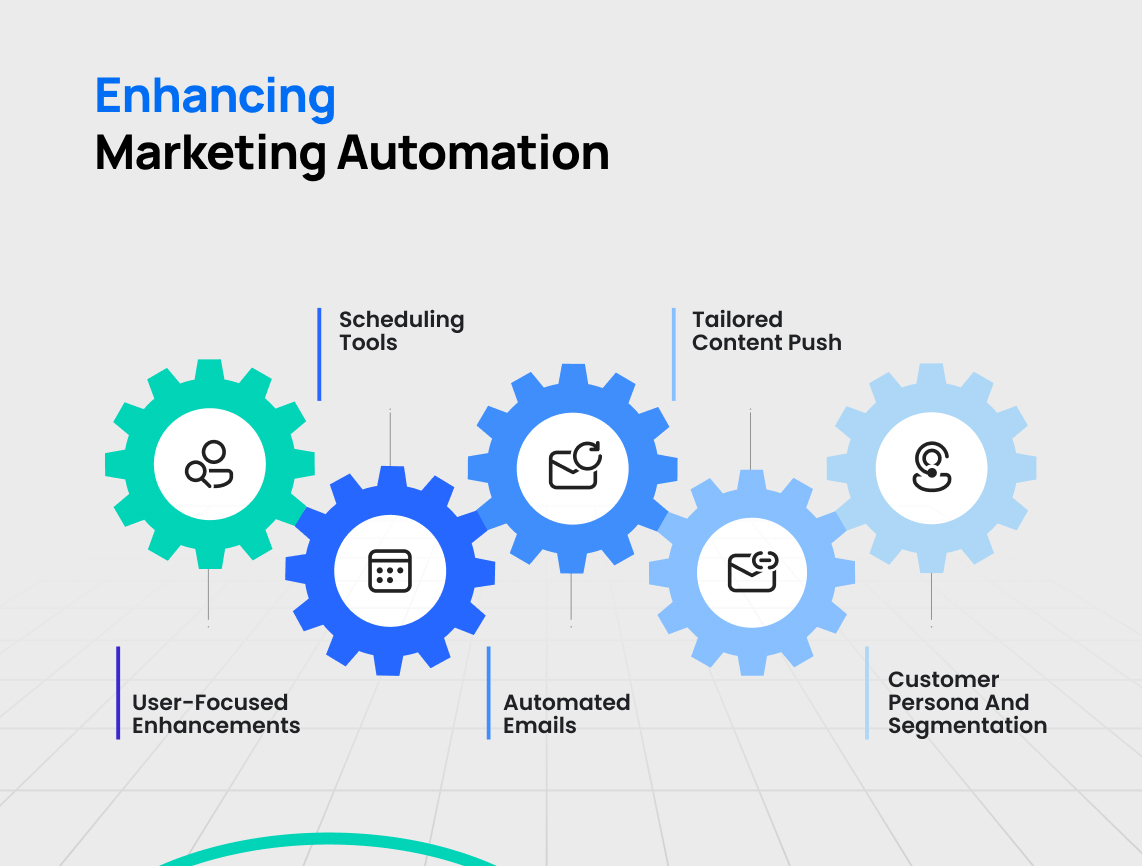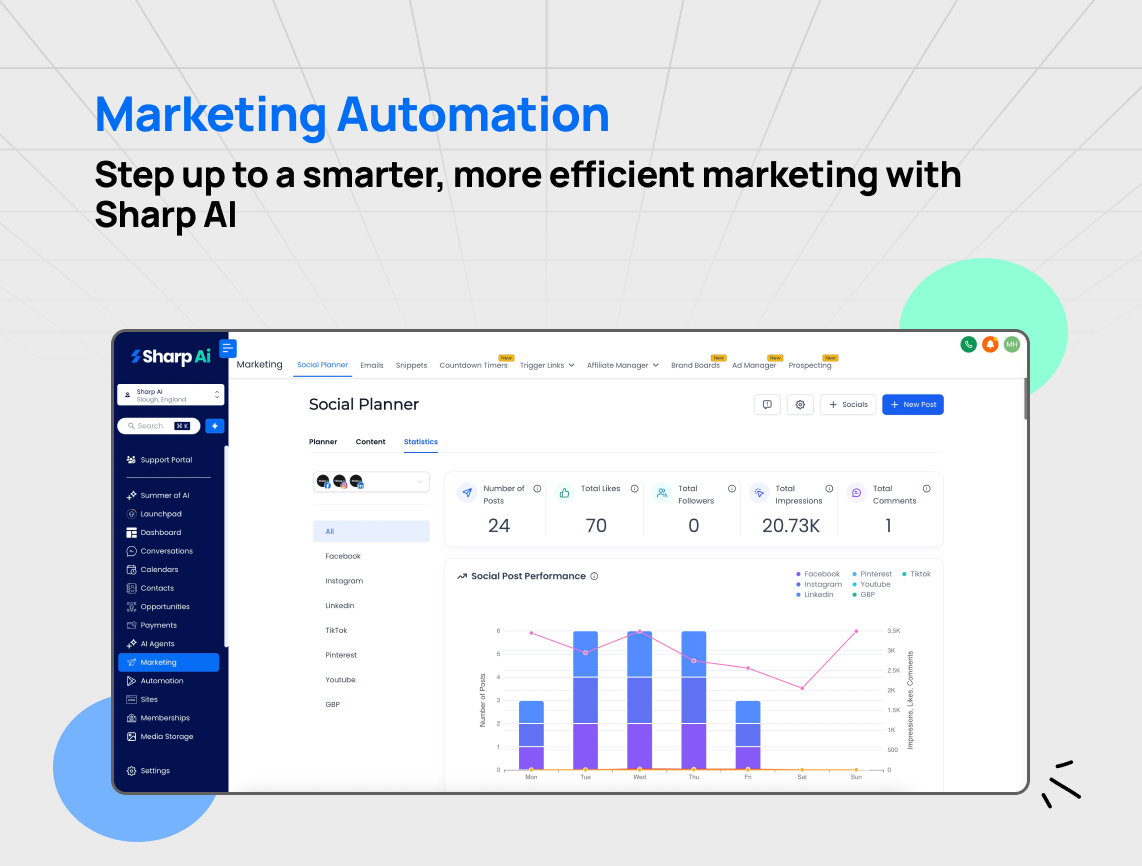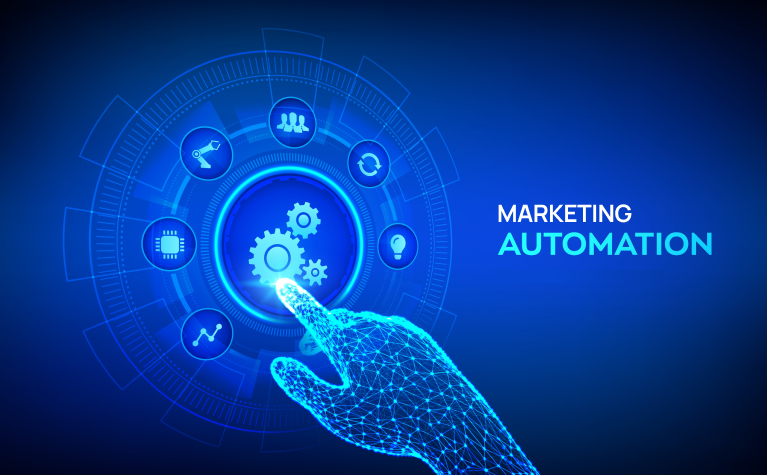Marketing automation takes the load off of human resources by automating repetitive tasks across multi-channel platforms like email marketing, social media posting, and texting service for businesses.
With personalised and optimised customer interaction, you can run relevant ad campaigns and secure a higher marketing ROI. This way, your team is left with the time and energy to handle the more creative aspects of the business.
The greatest touchpoint of marketing automation solutions is that workflows are primarily defined in the form of a template, but they can also be modified at the start or mid-campaign level to adjust to the customer’s desire. With increased efficiency, it creates a space for no human error, automating workflows to benefit teams and your clients alike.
How does Marketing Automation Work?
With built-in Artificial Intelligence(AI), marketing automation captures the leads and moves them through a sales funnel. With personalised content delivered at the right time and the right place, effective marketing automation technology integrates with the CRM to encourage lead nurturing and customer tracking. Well-operated best crm with marketing automation platforms are designed to scale with your business, affecting the time and marginal cost that tend to increase as your enterprise grows. Following a digital marketing strategy, marketing automation frees you of the responsibility to manually press “send” on every email message, campaign or post you run. Irrespective of the customer saturation of 100 or 100 million, it promises a personal experience for your entire customer base.
Use Case Scenario:
Lead Nurturing:
Let’s say you offer a B2B service, and your goal is to nurture leads that have shown initial interest. Here’s how automation helps build trust and move them down the sales funnel:
Initial Contact Email:
After a lead fills out a contact form or downloads an e-book from your website, they automatically receive a welcome email with a relevant case study that highlights your service’s success.
Educational Drip Campaign:
Over the next few days or weeks, they receive a series of educational emails explaining the benefits of your services, using real-world examples and offering valuable industry insights that position you as a thought leader.
Targeted Offers:
Once a lead interacts with key content, like clicking on a pricing page or requesting a demo, they’re added to a special list and receive a bespoke offer, such as a free consultation or a discounted trial of your service.
This directed, automated approach ensures that leads get the right information at the right time, helping them feel more confident in moving forward with your service.
What Can Marketing Automation Do to Help Your Business?
A common stimulant encountered by businesses is generating leads and converting them into prospects, with the idea of keeping the customer journey at the spear. Organisations have heaps of collected data, and somehow find it difficult to apply it to a certain cause.
With the help of integrated analytical tools, marketing automation assists in the customer segmentation process and formulates detailed customer profiles of what appeals to them. It supports you in arranging this stack of data and making use of it to roll out relevant and personalised content.

Marketing Automation Impact on Customer Lifecycle
Marketing automation provides a 360-degree customer view to align with your brand touchpoints. It holds multi-channel capabilities to create relevant bulk content and messaging. Yes, we are not sticking to just changing the name and subject line, in our email messages- marketing automation outreach extends far beyond this. Combine mobile messaging with your email and social media campaigns by using SMS, MMS, push notifications, and group messaging to reach your audience for a more effective digital marketing strategy.
It assists in generating digital ads that pop up at the right time, i.e. when the prospect is warm enough to make a purchase. Marketing automation leaves you room for smart work by automatically recommending and featuring the right products from your website on an individual preference level. With automated marketing strategies, you can lay the groundwork for your customers, which will turn into a loyal base and that will recommend your product or services to their network.
Streamlined Processes
One of the major characteristics of the business is to identify and value the pattern of the customer journey rather than focusing on business needs. Marketing automation, when intermingled with a human touch, puts your business on a whirlwind to business growth. It breaks down silos and data discrepancies to pave a smooth, unified workflow process for your small-to-medium scale businesses.
Statistics show that 71% of the customers expect businesses to know their history and personal experience with a certain brand. Marketing automation software is structured for teams to reduce manual customer effort at every milestone- from first interaction to the final purchase.
With this strategy in place, it replaces the need for complicated hand-offs, because everything is stored in central data storage, and the custom-built workflow can help you manage and prioritise tasks as per need. Along with the integration of CRM and marketing automation, you can organise contacts, so customers’ actions are secured as another data point. Customer journey is mapped out using these points, to gear up and connect with either educational content, a salesperson or customer success check-in.
The immediate advantage of marketing automation software is that it doesn’t play the same book on repeat; it has the agility to customise it for thousands of your customers, better known as a white-glove approach.
Knowing Marketing Automation Best Practices
Align Marketing and Sales Teams
Marketing automation is the core combo of software and a well-executed customer-centric strategy. Successful marketing automation gets your marketing and sales team on the same page. This well alignment adapts to your shifting business models and promotes collaboration in a well-structured approach.
Example: If the contact records of the leads are owned by the marketing department, then they first wait until the lead is warm enough to be qualified as a prospect and pass it on to be contacted by the sales team. At this particular stage, automation categorises and notifies the sales rep. Finally, when the customer makes a purchase, customer success takes over, and they can see all the push points, actions and conversations that the customers resorted to make that decision.
Pro Tip: This process optimises customer-business relationships, promotes long-term sales, and keeps the customer’s purchase and interaction history in check for future reference.
Develop Dynamic Content
Customers are time-sensitive to attractive opportunities- automation gets down to business by tracking behavioural analytics in your CRM to only show your prospects the products or services they are really interested in. It is strongly advised to create a content library with all the proportional content, guiding through each stage of the customer lifecycle.
Designing content with absorbing relevancy, using your buyer persona, from advertising to email marketing, can put your small business on a path to evergreen success.
Automate Tasks+ Offer Omni-channel Marketing
Cut through the noise by automating tasks that are valuable to your business. This breakdown of elements into segments divides the tasks into manageable chunks, for marketers, simplifying the pattern, triggers, and actions of a customer. Data is gathered and compiled in your marketing software, so you offer prospects a personalised customer experience(CX) like targeted emails, pre-filled forms, that sit well with their needs.
With automation, your clients get the same experience, regardless of the channel they contact you. This approach saves you the hassle of tracking down prospects on multiple forums and platforms, and boosts efficiency.
Set Clear Targets and Integrate Analytics
For a resounding success for your business, it is imperative to set clear goals to guide your marketing team and its efforts. By measuring the metrics and the acquired ROI, it can help you stay on track, to help you modify your market strategy for present and future campaigns as per demand.
With its cross-platform compatibility, it can help you assess the scope of your progress in real-time, through mobile apps or any other device. Some of the pre-defined metrics are CTR ( click-through rates), timings, channels, number of conversions and much more. Use some of the time that you get back from automation to dig into analytics, expand your view of customers beyond CRM and see what works and what doesn’t.

Best Tools to Automate Marketing Campaigns
Marketing automation software comes with its own set of accessible tools, each better than the other, to help you ace your goals. When selecting, the standard is to have a good assessment of your unique business needs, such as automated emails, social posts, or lead management, and opt for software that clearly fulfils your criteria.
Expert Insight: The right tools will help you make the desired impact on your target audience, for a more effective approach, within your expected timeframe.
Let’s share the tools that work for marketing automation for small business growth.
Scheduling Tools
Marketing automation tools let you schedule content, like email, social media, push notifications, and SMS, so that it reaches the customers at just the right time, without the need for manual input.
Tailored Content Push
When a customer interacts or takes an action, you can immediately fan out the engagement scheme by sending them a follow-up message. This strategy will help customers further cement their decision on your product or service and pass through the Sales Pipeline Management.
User-focused Enhancements
Proper and precise data can keep your customers engaged and interested, encouraging a meaningful connection, and keeping the conversation revolving around customers’ topmost priorities.
Customer Persona and Segmentation
Automation tools are capable of automatically collecting customers’ data, in a format to form data-driven strategies and present that information in ways that most appeal to your segmented audience.
Automated Emails
A redundant email format that has lost its context and meaning feels flat. For example, if a prospect has left items in their cart and you want them to make a purchase ASAP, automation takes over, and devises a striking personalised email that is sure to get you noticed.
Tired of Juggling Endless Marketing Tasks?
Step up to a smarter, more efficient marketing with Sharp AI. Our cutting-edge marketing automation is invested in delivering hyper-personalised customer experiences at scale, effortlessly. You can streamline your workflows, maximise ROI, and outpace competitors with AI-driven automation.
The future of marketing is here—don’t get left behind. Start your automation journey today and watch your business boom.
Sharp AI can help
Implementing marketing automation with Sharp AI shifts the way you engage with your audience. Designed for simplicity and power, our platform handles everything from lead nurturing to multi-channel campaign optimisation—so you can focus on what matters: building real connections. Whether you’re a growing business or an enterprise, Sharp AI bridges the gap between marketing and sales, ensuring every interaction is meaningful, measurable, and impactful.
With Sharp AI, we automate and support personalised experiences that drive loyalty and growth, all powered by intelligent automation.
The best part? Getting started is easy. See a live demo or try it for free —your next breakthrough is waiting.

FAQs
What do you mean by marketing automation?
Marketing automation is like having a smart assistant for your marketing tasks. It uses software to handle repetitive jobs—like sending emails, posting on social media, or tracking leads—so you can focus on strategy and creativity. It saves time, reduces errors, and helps deliver personalised experiences to customers.
What is CRM and marketing automation?
A CRM (Customer Relationship Management) system stores customer data and interactions, helping you manage relationships. Marketing automation takes it further by using that data to automate campaigns, nurture leads, and personalise messaging. Together, they help you engage the right people at the right time—without manual effort.
Is marketing automation an AI?
Not exactly. Marketing automation is rule-based (e.g., “Send this email if a user clicks X”). However, many tools (like Sharp AI) now use AI to enhance automation, predicting customer behaviour, optimising send times, or personalising content dynamically. So while automation is the “what,” AI is the “how” that makes it smarter.
What does “bad” or “good” marketing automation look like?
Good marketing automation feels seamless and helpful, like a personal caretaker for your customers. It:
✔ Delivers relevant content (right message, right time).
✔ Nurtures leads without being pushy (no spammy follow-ups).
✔ Saves time while boosting engagement and ROI.
Bad marketing automation feels robotic and annoying, like a broken chatbot. It:
✖ Blasts generic messages (Like: “Dear [First Name]”).
✖ Over-automates (ignoring human nuance).
✖ Fails to sync with other tools, creating messy workflows.
The key? Balance automation with a human touch—efficiency shouldn’t sacrifice empathy.
How can I get started with marketing automation?
Start with your goals – Need lead nurturing? E-commerce personalisation? Scale?
Check integration options – Does it work with your CRM, email tools, etc.?
Look for ease of use – Clunky software = wasted time (and frustration).
Prioritise analytics – Can you track ROI and tweak campaigns easily?
Test scalability – Will it grow with your business?
Pro tip: Try a free demo (Sharp AI offers one!) to see if it fits your workflow before committing. The best tool simplifies your job, not complicates it.
Is Sharp AI marketing automation suitable for small businesses?
Absolutely! Sharp AI’s marketing automation is designed to grow with your business, whether you’re a scrappy startup or an expanding SMB. Here’s why it’s a great fit:
✔ Affordable & Scalable – No enterprise-level complexity or budget required. Start small, automate key tasks (like emails and lead follow-ups), and scale as you grow.
✔ Easy to Use – Intuitive tools mean you don’t need a tech wizard on staff. Set it up fast and focus on your customers, not clunky software.
✔ Smart Features for Big Impact – Automate personalised campaigns, track what’s working, and nurture leads—without hiring a full marketing team.
✔ Plays Well with Others – Integrates with tools you already use (like your CRM or social platforms) so everything works seamlessly.
Small businesses thrive with Sharp AI because it’s built to save time, boost sales, and make every marketing effort count.




